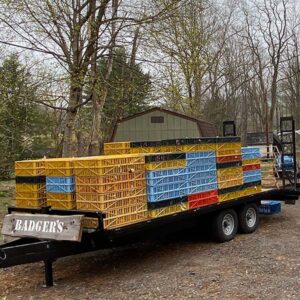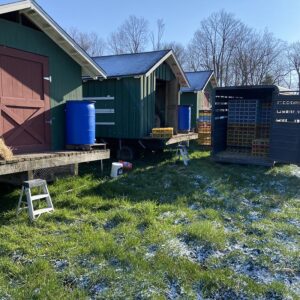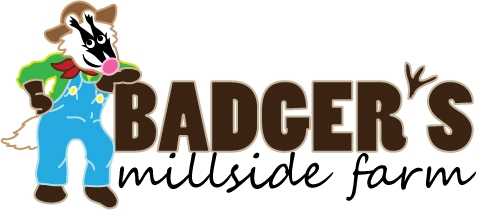 Pullet Pickup Day is a time to celebrate. There’s so much hope wrapped up in the promise of an egg – the perfect food. And whether you’re raising to feed your own family or the families in your community, this is a highly anticipated day. It can also be somewhat hectic!
Pullet Pickup Day is a time to celebrate. There’s so much hope wrapped up in the promise of an egg – the perfect food. And whether you’re raising to feed your own family or the families in your community, this is a highly anticipated day. It can also be somewhat hectic!
It’s not complicated, but here are some things to help make the trip smoother.
Planning to Arrive
We’ll supply you with a date and a time window. It sounds obvious, but this is when you should plan to arrive. Some of you are the perennially early bird. If we tell you 2pm, you’ll be here at noon wondering where the birds are. Others, are less conscious of time or have constraints that will push you to the end of the pickup window.
Not everyone necessarily has the same pickup window. We often schedule larger pick up orders to come an hour before others so that we can try to keep the bottlenecks to a minimum.
Your arrival time and pickup date are not random. The birds are not raised here. That means they are picked up and driven back to Hughesville where we’ll meet you. Traffic, unplanned delays, and breakdowns can happen, and so we try to plan for some of those unforeseen circumstances.
Just understand that we’re humans transporting live birds in circumstances we don’t always control. Most of you farm, so you can roll with the punches. Everybody else should lean into the flexibility and patience.
Live Bird Urgency
One of the reasons we insist that you pick up your birds on pick up day is because the birds aren’t grown here. We’re transporting them from somewhere else, and as such, they’re in crates waiting for you. The sooner you get them from us, the sooner they can be uncrated on your farm and receive water and food. The chickens can tolerate being crated for long periods of time; however, it is a stressor for them.
These birds are living creatures and you’re depending on them to either provide food for your family or to provide income in your business. We firmly believe that picking up these birds is one of the most important things you need to do that day. Like anything else, there’s nuance here, but far too often, we see people who take a lackadaisical approach to picking up their birds by intentionally making pickup up their birds the last thing they do that day. Our point is – these birds are your priority.
Arriving
The biggest mistake we see is customers driving by us. The crowd of cars and stacked chicken crates don’t always register. You’ll come in on Route 220.
As soon as you turn onto Pine Run Rd from Route 220, you have arrived.
Pay attention to the cars there. You may pull onto the grass along Pine Run Rd or into the driveway if it’s open. You can also pull past the driveway. Put your hazard lights on and check in.
Checking In
Mike, Christie, or Cameron will get you checked in. We’ll typically need your name, and we’ll collect any remaining balance. Feel free to hang out and chat with other customers while you wait for your birds.
Picking up Birds
We respect your time, so having birds crated and ready to be transferred is the fastest way to get you in and out of our driveway. If you’ve ever picked up pullets from a farm where they caught each order from the barn as you arrive (or worse, enlisted you to help), then you know what a slow pain that can be.
When it’s your turn, we’ll direct you where to go. We have the birds crated and waiting for you. Transferring the birds from our crate to your crate is the goal.
This is the process that really tests our ability to count and keep track of things. We often have exactly the number of birds that we need for pick up that day, so we need to get this right. We don’t want to short you or us! With that in mind, here’s some guidelines.
- Someone named Badger will remove crates from the trailer and unload the birds.
 You can get your crates ready, operate the door, and organize them onto your truck.
You can get your crates ready, operate the door, and organize them onto your truck.
Transporting
We encourage the use of poultry transport crates above everything else. Boxes and dog kennels can get you by if you have a relative few pullets. See our FAQ page for additional information.
Uncrating at Farm
Please have water and feed available for the birds before you uncrate them. They will drink more water than normal in the first 24 hours, so don’t skimp on this. Consider doubling the drinker space for the first 12 hours – something like a few rubber water pans can work here. After they drink, they’ll eat.
